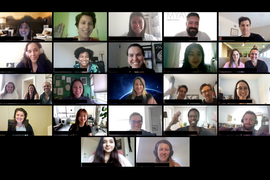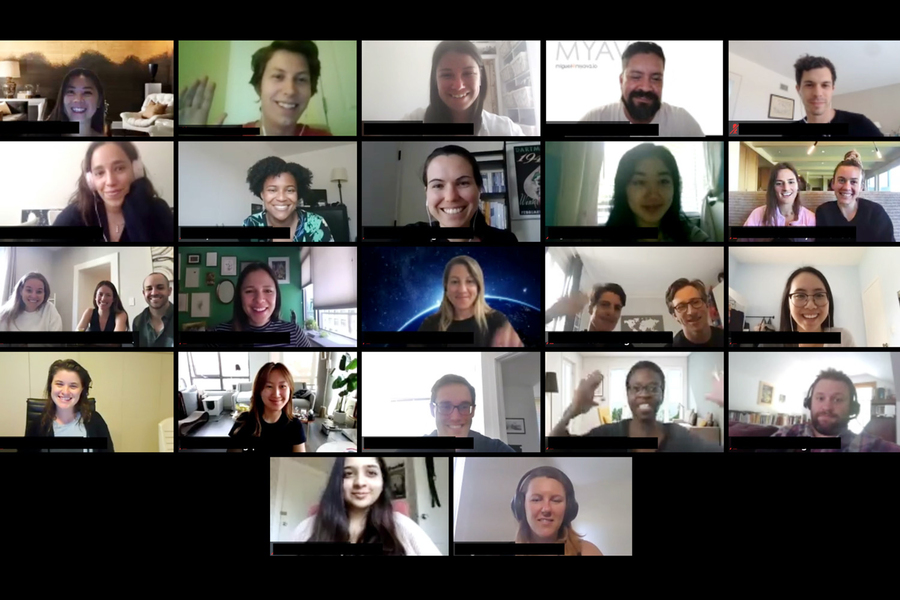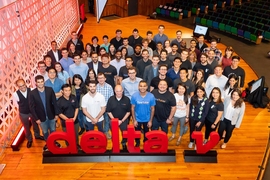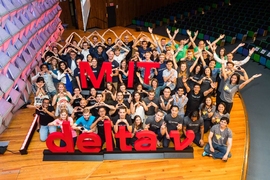On March 10, with uncertainty around Covid-19 at its peak, staff members at the Martin Trust Center for MIT Entrepreneurship gathered to decide if they should hold the delta v summer accelerator. The program had always relied on students’ physical presence on campus to immerse them in startup life and teach them about entrepreneurship.
“Everyone was in shock back in March, and people just assumed we weren’t going to be doing delta v,” says Managing Director Bill Aulet. “We realized the students were really on board, and we’d been talking a lot about antifragility, how in times of crisis people need to get stronger. Quickly we said, ‘We’ve got to do it — it’s more important than ever.’”
Last week’s virtual Demo Day, which allowed delta v’s student participants to showcase the progress they’ve made on their businesses over the last four months, vindicated that decision.
In total, 15 student teams involving 60 entrepreneurs gave presentations, proving it’s possible to achieve major company-building milestones in the middle of a pandemic. Like in years past, the teams were split between Cambridge and New York cohorts depending on where their companies had the highest chance of success. This year, however, participants Zoomed in from around the world.
To be sure, a lot of things were different about this year’s delta v. Still, much remained the same.
“For 90 days, they still eat, sleep, and breathe their startup,” Trust Center Executive Director Trish Cotter says.
Companies worth building
This year’s startups spanned industries from fashion to finance to fishing. The founders know they still have much work to do, but the event was a chance to celebrate their progress so far.
The Earned Credit Project (ECP), one of the startups in this year’s cohort, uses a financial platform to help parents making less than $40,000 a year. The team did over 50 user interviews and has already built out some early tools and resources on its website.
“For us, it was a transformative program,” says CEO and co-founder Clare Herceg MBA ’20. “With everything virtual, it was unknown what the summer was going to be like. But I think ultimately it meant we had really engaged teammates and board members, and opportunities to get feedback from people in both cohorts, New York City and Cambridge.”
ECP made some major pivots this summer based on early conversations with customers, but it’s now in late stage talks with a large national partner to begin serving first-time moms this fall.
Another startup in this year’s program was qBraid, which has created a development platform for quantum computing. The platform runs in the cloud, removing prohibitive hardware constraints, and offers development kits for major quantum computers from companies like IBM and Google, allowing anyone to write code for quantum computers without struggling through traditional siloes.
The company has already secured its first paid customer, a private coding boot camp, and is launching at two universities this fall.
qBraid co-founder Jason Necaise ’20 said his team knew going into the program that things would be different. He says his team made an effort to stay connected and prepared for challenges like Zoom fatigue. Still, his assessment of delta v sounded a lot like participants from any other year.
“Delta v was the most intense program I’ve participated in at MIT — and that’s saying something,” Necaise says. “I definitely felt the fire, even though everyone was on the other side of the computer screen.”
Learning about entrepreneurship
As in year’s past, the program featured weekly meetings with mentors, monthly board meetings, and frequent “office hours” with entrepreneurs in residence (EIRs). This year, with everything virtual, the Trust Center decided to bring in more mentors, increase the number of board members for each startup, and lengthen EIR office hours. The Trust Center also added a financial literacy lesson and an investor presentation day for interested founders.
“We really strengthened our digital game, using technology to provide value to the students and integrate outside parties into it,” Aulet says. “What we traded for that was the one-on-one staff interactions that weren’t intentional and were more relaxed. When we go back to that, we’ll have built up muscles on the digital side that will give us the ability to appreciate those serendipitous collisions.”
And just as the Trust Center’s staff brought their A game, organizers say participating students were as impressive as ever.
“There was more put on the student learner to be engaged, but the students showed up,” Cotter says. “It’s not easy being on Zoom. It’s also not easy to sell in a Covid-19 environment, so they had to get creative in getting market research done, in evaluating unit economics and evaluating their financials. Success came from using technology, using the resources we have, using the network, and using their peers in the cohort.”
In addition to The Earned Credit Project and qBraid, the other startups in this year’s cohort were:
- Aimvest Technologies: helping financial planners with an asset management platform that gives them quantitative risk management models and helps them set goals for their clients’ portfolios;
- AuraBlue: developing a cooling mattress pad that connects to a sensing bracelet for women who experience sleep disruption due to hot flashes during menopause;
- Floe: developing a solution to detect and prevent ice buildup on commercial properties to prevent damage caused by ice dams;
- MomMe: developing products to help new mothers emotionally and physically recover from childbirth, including an app-connected pad that promotes vaginal healing and reduces pain;
- Myava: removing uncertainty around buying clothes online with customized avatars and personalized recommendations, including a “virtual try-on” option that lets customers see how clothing will fit on their bodies;
- Thiozen: offering a novel process of generating hydrogen for the oil and gas supply chain that is less expensive and less carbon intensive than current production methods;
- Contack: helping hiring managers predict the lifetime value of customer service agent job candidates in large contact centers;
- E-Fish: an e-commerce and supply chain company helping seafood harvesters and offloaders get fish to sellers;
- NRICH Invest: helping college students start investing with survey-based recommendations and an online community of peers;
- Preloved: a parent-to-parent marketplace for preowned baby gear;
- Respezy: an app that offers college students personalized Covid-19 risk assessments and helps them track their behavior to lower their risk of infection, and which will help millennials adopt healthier behaviors after the pandemic is over;
- TORSO: a fashion company creating clothing for women that combines outergarments with undergarments; and
- WellMode: a platform for wellness entrepreneurs that optimizes online content and offers services to edit, host, and monetize video.
The Trust Center talks a lot about the ability to overcome adversity, and running a startup in the middle of a global pandemic is a great way to demonstrate that skill.
“Antifragile is how we describe the mindset of entrepreneurship,” explains Carly Chase, a senior lecturer at MIT’s Sloan School of Management and an entrepreneur in residence at the Trust Center, who runs delta v’s New York City cohort. “Antifragile humans can thrive in chaos, can deal with ambiguous environments, can stay agile and adaptable regardless of the situation, and not just play defense and be resilient, but play offense and make something better out of a difficult situation. I don’t think there’s a better moment to prove the value of being antifragile. What I saw in my teams is that these are strong individuals. They believe in themselves, they can deal with ambiguity and thrive in an environment with so many unknowns.”
Indeed, after starting in an environment of much uncertainty, in the end the most important parts of the delta v program remained intact.
“It looked a little bit different this year, but it was the same great community, same great program, and same hustle we always see,” Chase says. “And regardless of where and when MIT students are building businesses, we're going to be there to support them.”









